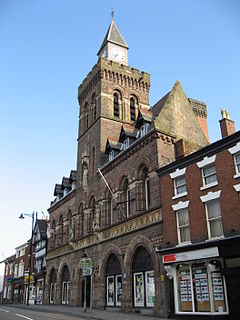Congleton
| Congleton | |
|---|---|
 Congleton Town Hall, completed 1866 |
|
| Congleton shown within Cheshire | |
| Population | 26,482 (2011) |
| OS grid reference | SJ854628 |
| Civil parish |
|
| Unitary authority | |
| Ceremonial county | |
| Region | |
| Country | England |
| Sovereign state | United Kingdom |
| Post town | CONGLETON |
| Postcode district | CW12 |
| Dialling code | 01260 |
| Police | Cheshire |
| Fire | Cheshire |
| Ambulance | North West |
| EU Parliament | North West England |
| UK Parliament | |
Congleton is a town and civil parish in Cheshire, England, on the banks of the River Dane 21 miles (34 kilometres) south of Manchester and to the west of the Macclesfield Canal. The town had a population of 26,482 according to the Census 2011.
Of unknown origin, the first recorded reference to the town's name was in 1282, when it was spelt Congelton. The element Congle could relate to the old Norse kang meaning a bend followed by the element the Old English tun meaning settlement.
The first settlements in the Congleton area were Neolithic. Stone Age and Bronze Age artefacts have been found in the town. Congleton was once thought to have been a Roman settlement, although there is no archaeological or documentary evidence to support this. Congleton became a market town after Vikings destroyed nearby Davenport.
Godwin, Earl of Wessex held the town in the Saxon period. The town is mentioned in the Domesday Book, where it is listed as Cogeltone: Bigot de Loges. William the Conqueror granted the whole of Cheshire to his nephew the Earl of Chester. In the 13th century, Congleton belonged to the de Lacy family.Henry de Lacy, 3rd Earl of Lincoln granted the town its first charter in 1272, enabling it to hold fairs and markets, elect a mayor and ale taster, have a merchant guild and behead known criminals.
In 1451, the River Dane flooded, destroying a number of buildings, the town's mill and wooden bridge. The river was diverted and the town rebuilt on higher ground.
...
Wikipedia

